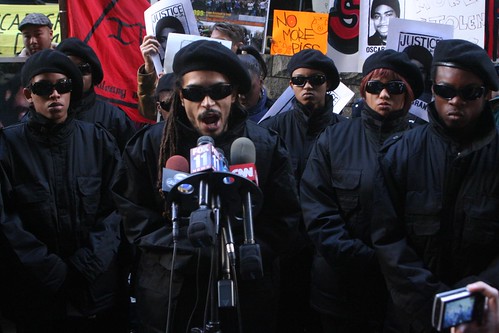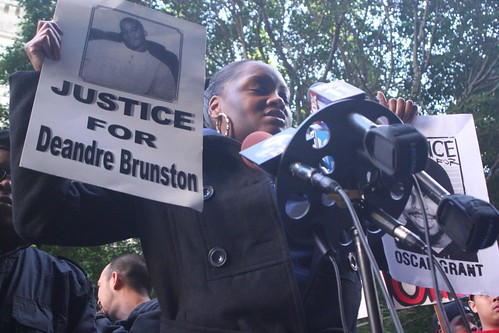 As the sun began to creep over the downtown skyline in Los Angeles, protesters began to assemble at the Shortridge Foltz Criminal Justice Center on January 8, the site where Johannes Mehserle stood before Judge Robert J. Perry for the first time. A banner reading, “We are all Oscar Grant. The Whole Damn System is Guilty!” was stretched out as passers-by honked in support. The now iconic face of a smiling Oscar Grant was plastered everywhere on picket signs, posters, and stickers. Leaders on the bullhorn began to chant, “Oscar Grant was lying down! We want justice for the town!” If Michael Rains, defense attorney for Johannes Mehserle, thought he could evade the community that stands behind Oscar Grant, he was wrong. Rachel Jackson, of the Oakland Assembly vowed at the press conference organized by the LA Coalition for Justice for Oscar Grant, warned, “You can run to Los Angeles. You can run to San Diego. And we will be there because you can run, but you cannot hide from justice!”
As the sun began to creep over the downtown skyline in Los Angeles, protesters began to assemble at the Shortridge Foltz Criminal Justice Center on January 8, the site where Johannes Mehserle stood before Judge Robert J. Perry for the first time. A banner reading, “We are all Oscar Grant. The Whole Damn System is Guilty!” was stretched out as passers-by honked in support. The now iconic face of a smiling Oscar Grant was plastered everywhere on picket signs, posters, and stickers. Leaders on the bullhorn began to chant, “Oscar Grant was lying down! We want justice for the town!” If Michael Rains, defense attorney for Johannes Mehserle, thought he could evade the community that stands behind Oscar Grant, he was wrong. Rachel Jackson, of the Oakland Assembly vowed at the press conference organized by the LA Coalition for Justice for Oscar Grant, warned, “You can run to Los Angeles. You can run to San Diego. And we will be there because you can run, but you cannot hide from justice!”This is to be the royal rumble of all police brutality cases to date. In one corner stands the defendant, Johannes Mehserle, the first cop in California history to be tried for murder while on duty. To his advantage, his case has been assigned to Judge Robert J. Perry. Judge Perry, who will bar all cameras from the courtroom, also presided over the case of Rafael Perez, the former LAPD songbird who was the central figure in the Rampart Police Division Scandal.
 Charged with stealing cocaine, reselling it, and framing innocent people, Judge Perry let Perez walk free after only serving 3 years of a 5 year sentence. The Rampart Scandal, which implicated Rampart division officers in cold blooded killings, the sale of narcotics, and bank robberies in the 1990s, and its successive cover up by the department itself and the media illustrates the landscape and culture in which the Mehserle trial is to be held. A fine-tuned and well-oiled media machine will definitely be a force with which Grant supporters will have to combat.
Charged with stealing cocaine, reselling it, and framing innocent people, Judge Perry let Perez walk free after only serving 3 years of a 5 year sentence. The Rampart Scandal, which implicated Rampart division officers in cold blooded killings, the sale of narcotics, and bank robberies in the 1990s, and its successive cover up by the department itself and the media illustrates the landscape and culture in which the Mehserle trial is to be held. A fine-tuned and well-oiled media machine will definitely be a force with which Grant supporters will have to combat.In the other corner, we have the growing community of supporters for Oscar Grant. As demonstrated by the Oakland Rebellion last January, they are a force to be reckoned with. Oakland organizer, Hannibal Shakur, stated, “It is was singly the consequence of collective community action that this police officer ever got charges in the first place.” The Mehserle camp will be under severe scrutiny and the people are prepared to cry foul should the defense throw any low blows. A change of venue out of Alameda County is perceived as a huge disadvantage to the Grant corner. As we learned from the acquittal of the cops that beat Rodney King, a change of venue is a get out of jail free card. However, in Mehserle’s case, his change of venue was not to a predominantly white town whose population was teeming with cops. Mehserle’s case was moved to Los Angeles, a city that still bears the scars of the LA Rebellion AKA LA Riots. Communities here are continually outraged by the terrorism of the
LAPD. Keisha Brunston, aunt of Deandre Brunston, the youth who was unarmed and shot 22 times by the LAPD in 2003, also spoke at the press conference. Her nephew, Deandre Brunston, was met with 80 rounds of ammunition during a standoff in which Brunston was armed with only a flip flop in hand. A police canine who was caught in the cross fire was air lifted by helicopter while Brunston, who was still alive, was left to die. It is the anger of community members in LA, like Keisha Brunston, that will help bring momentum to the growing movement that “is Oscar Grant.”
What we saw at the Criminal Justice Center was a convergence of the elements. Like cool wind and warm water, when you put the forces of The Bay and Los Angeles together, you will get a storm of epic proportion. Right now that storm is still brewing. Come weigh-in time in May, when the rumble is set to begin, you can expect the people to rain torrents on the Mehserle trial.
See all photos here.
See all photos here.









No comments:
Post a Comment